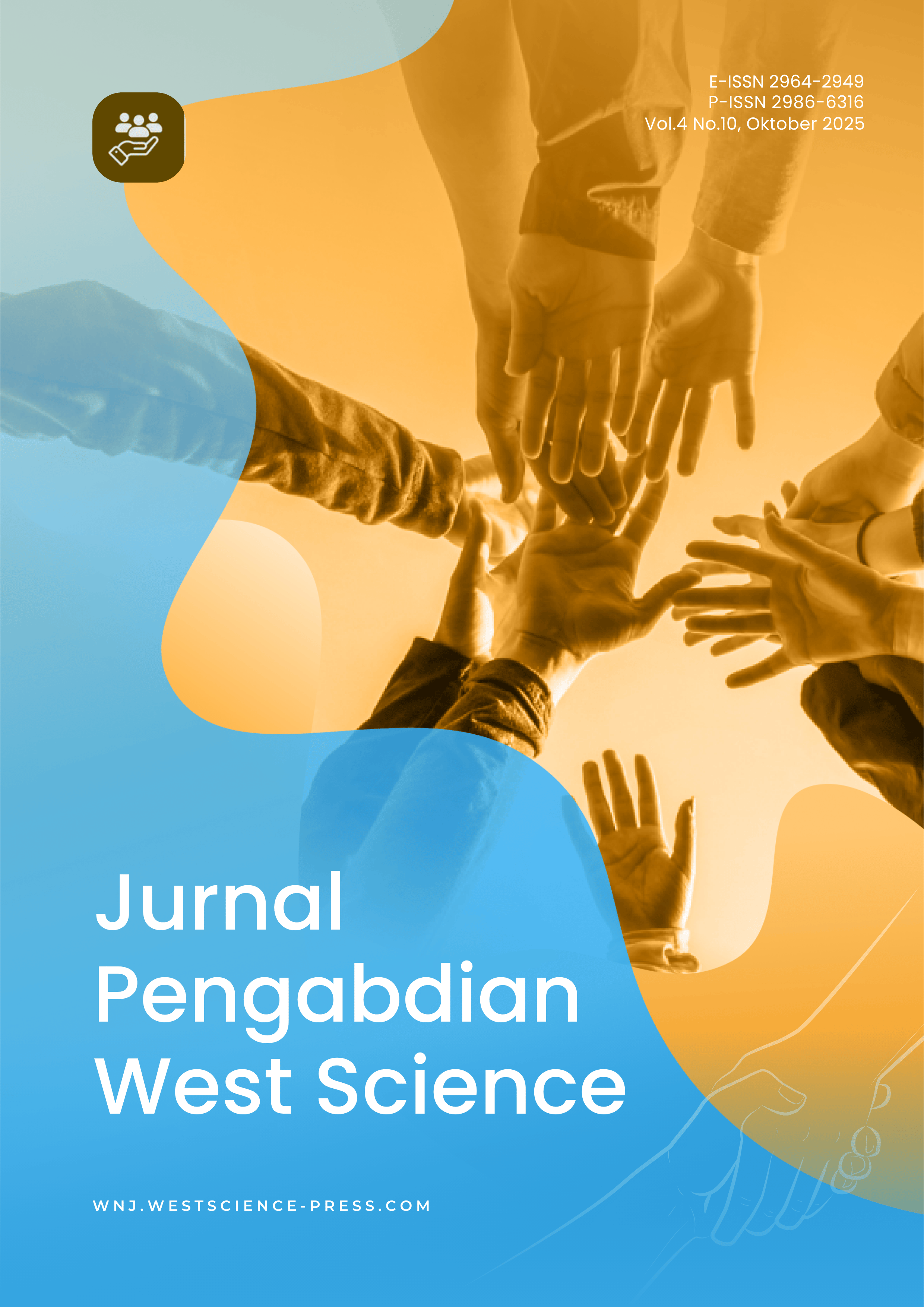Seminar Parenting: Mengenal Karakter, Potensi, dan Baterai Kasih Sayang Anak Sebagai Upaya Preventif Dalam Penguatan Mental Emosional Anak Usia Dini
DOI:
https://doi.org/10.58812/jpws.v4i10.2726Kata Kunci:
Seminar Parenting, Temperamen, Kecerdasan Majemuk, Bahasa Kasih, Attachment, Anak Usia DiniAbstrak
Artikel ini dilatarbelakangi oleh semakin kompleksnya tantangan pengasuhan anak di era modern, ketika orang tua kerap kesulitan memahami karakteristik unik anak. Tujuan penulisan adalah menganalisis efektivitas seminar parenting dengan tiga fokus utama: mengenali temperamen, mengidentifikasi potensi melalui kecerdasan majemuk, serta memenuhi kebutuhan kasih sayang dengan konsep “baterai kasih”. Metode yang digunakan berupa studi literatur dengan pendekatan kualitatif deskriptif melalui kajian teori psikologi perkembangan dan pengasuhan. Hasil analisis menunjukkan bahwa pemahaman temperamen anak membantu orang tua menerapkan pola asuh yang tepat, sehingga konflik dan pelabelan negatif berkurang. Perspektif kecerdasan majemuk memperluas pandangan orang tua bahwa potensi anak melampaui aspek akademik. Sementara itu, pemenuhan kebutuhan kasih sayang melalui “Bahasa Kasih” membangun kelekatan aman sekaligus kesehatan emosional. Disimpulkan bahwa seminar parenting yang mengintegrasikan ketiga aspek tersebut merupakan intervensi preventif efektif dan layak disebarluaskan guna meningkatkan kesadaran kolektif akan pentingnya pengasuhan berbasis pemahaman individu anak.
Referensi
Agustina, R. (2021). Pemahaman orang tua terhadap multiple intelligences dan dampaknya pada pengembangan potensi anak usia dini. Jurnal Pendidikan Anak, 10(2), 112–125.
Ainsworth, M. D. S. (2015). Patterns of attachment: A psychological study of the strange situation. Psychology Press.
Armstrong, T. (2017). Multiple intelligences in the classroom (4th ed.). ASCD. Bandura, A. (1977). Social learning theory. Prentice Hall.
Baumrind, D. (1991). The influence of parenting style on adolescent competence and substance use. Journal of Early Adolescence, 11(1), 56–95.
Bornstein, M. H. (2019). Handbook of Parenting: Volume 1: Children and Parenting. Routledge.
Bowlby, J. (1969). Attachment and Loss, Vol. 1: Attachment. Basic Books.
Brown, A., et al. (2021). Effectiveness of Parenting Workshops: A Study of 50 Participants. Journal of Child Development, 15(2), 112-125.
Chapman, G. (1992). The 5 Love Languages: The Secret to Love that Lasts. Northfield Publishing.
Collins, W. A., Maccoby, E. E., Steinberg, L., Hetherington, E. M., & Bornstein, M. H. (2000). Contemporary research on parenting: The case for nature and nurture. American Psychologist, 55(2), 218–232. https://doi.org/10.1037/0003- 066X.55.2.218
Darling, N., & Steinberg, L. (1993). Parenting style as context: An integrative model. Psychological Bulletin, 113(3),487–496. https://doi.org/10.1037/0033- 2909.113.3.487
Else-Quest, N. M., Hyde, J. S., & Goldsmith, H. H. (2018). Gender differences in temperament: A meta-analysis. Psychological Bulletin, 144(6), 543–586. https://doi.org/10.1037/bul0000131
Gardner, H. (1983). Frames of Mind: The Theory of Multiple Intelligences. Basic Books. Gardner, H. (2011). Frames of mind: The theory of multiple intelligences (3rd ed.). Basic Books.
Gordon, T. (2019). Parent effectiveness training: The proven program for raising responsible children (Revised edition). Harmony Books.
Gottschalk, F. (2019). Impacts of technology use on children: Exploring literature on the brain, cognition and well-being. OECD Publishing. https://doi.org/10.1787/8296464e-en
Hurlock, E. B. (2018). Psikologi Perkembangan: Suatu Pendekatan Sepanjang Rentang Kehidupan (Edisi Kelima). Erlangga.
Kementerian Pemberdayaan Perempuan dan Perlindungan Anak (KPPPA). (2022). Survei Nasional Pemahaman Orang Tua tentang Kebutuhan Emosional Anak. Jakarta: KPPPA.
Kornhaber, M. L. (2009). Multiple intelligences: From the ivory tower to the dusty classroom- But why? Teachers College Record, 111(1), 65–75.
Lamb, M. E., & Lewis, C. (2013). Father-child relationships. In N. Cabrera & C. S. Tamis- LeMonda (Eds.), Handbook of father involvement: Multidisciplinary perspectives (2nd ed., pp. 119–135). Routledge.
Livingstone, S., & Blum-Ross, A. (2020). Parenting for a Digital Future: How Hopes and Fears about Technology Shape Children's Lives. Oxford University Press.
Maccoby, E. E., & Martin, J. A. (1983). Socialization in the context of the family: Parent- child interaction. In P. H. Mussen (Ed.), Handbook of Child Psychology (pp. 1– 101). Wiley.
Nomaguchi, K., & Milkie, M. A. (2020). Parenting stress: A developmental and family perspective. Journal of Marriage and Family, 82(1), 61–84. https://doi.org/10.1111/jomf.12676
Pinquart, M. (2017). Associations of parenting dimensions and styles with externalizing problems of children and adolescents: An updated meta-analysis. Developmental Psychology, 53(5), 873–932.
Putri, D. A., & Sari, R. P. (2020). Tantangan pengasuhan anak dengan temperamen sulit: Studi kasus pada orang tua di wilayah urban. Jurnal Ilmu Keluarga dan Konsumen, 13(1), 45–58 .https://doi.org/10.24156/jikk.2020.13.1.45
Rahmawati, F., & Hidayat, R. (2022). Pengaruh pemenuhan bahasa kasih terhadap keterikatan aman dan regulasi emosi anak usia dini. Jurnal Psikologi Perkembangan, 15(2), 88–102. https://doi.org/10.20885/psikologiperkembangan.vol15.iss2.art6
Rothbart, M. K., & Bates, J. E. (2006). Temperament. In W. Damon & R. Lerner (Eds.), Handbook of child psychology: Vol. 3. Social, emotional, and personality development (6th ed., pp. 99–166). Wiley.
Sanders, M. R., & Morawska, A. (2018). Handbook of Parenting and Child Development Across the Lifespan. Springer.
Santrock, J. W. (2021). Life-span development (18th ed.). McGraw-Hill Education. Smith, J., & Johnson, T. (2020). Parenting Intervention Outcomes: Quantitative Analysis of 50 Participants. Child Development Perspectives, 14(2), 67-79.
Thomas, A., & Chess, S. (1977). Temperament and Development. Brunner/Mazel.
Wentzel, K. R. (1998). Social relationships and motivation in middle school: The role of parents, teachers, and peers. Journal of Educational Psychology, 90(2), 202–209. https://doi.org/10.1037/0022-0663.90.2.202
Unduhan
Dimensions
Diterbitkan
Terbitan
Bagian
Lisensi
Hak Cipta (c) 2025 Angginun Juwita Sari Harahap, Bella Intan, Arya Mustofa, Agung Azhar, Rizky Khairunnisa, Adi Irman, Nurul Fajrin, Yuda Ripki, Izaazun Nadwah, Simbar Ramadhandi, Amie Primarni, Anissa Maharani

Artikel ini berlisensiCreative Commons Attribution-ShareAlike 4.0 International License.






















 Instagram
Instagram 